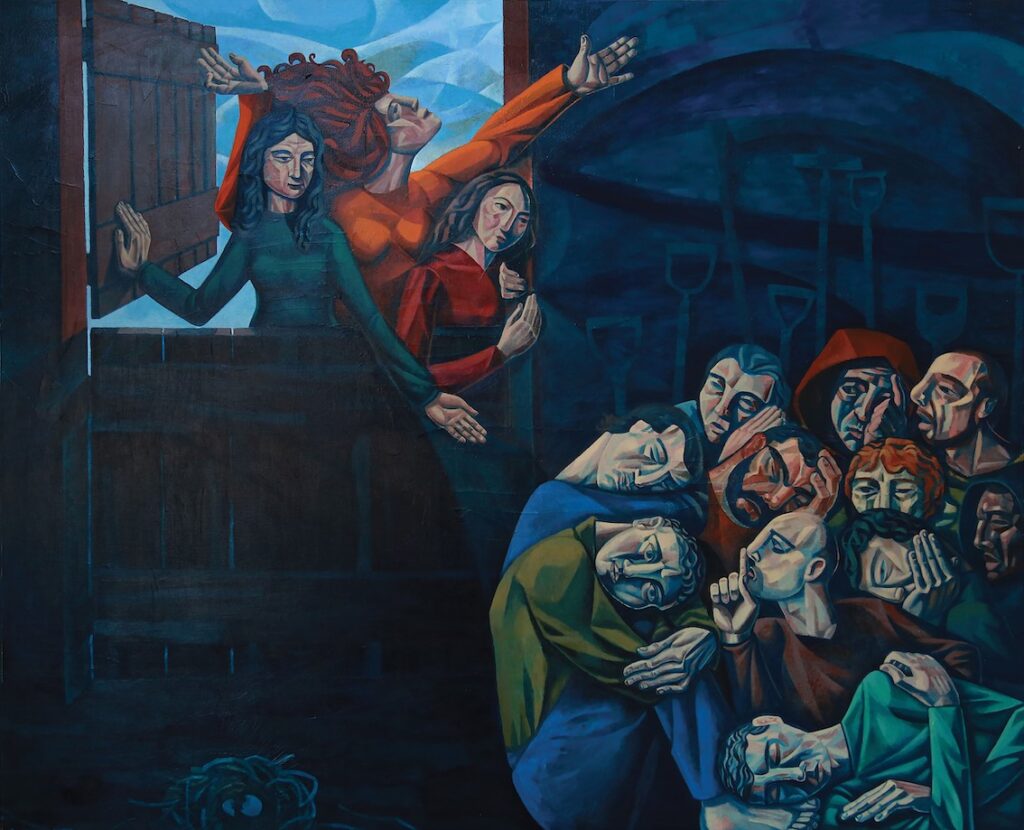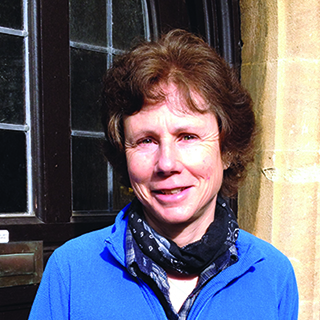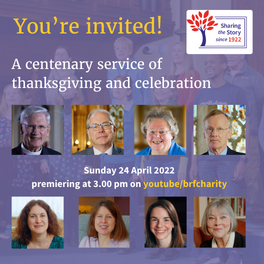Sally Welch reflects on Luke’s telling of the Easter story, taking inspiration from an original painting by Michael Cook.
17 April 2022

This picture, entitled An Idle Tale, is by Michael Cook, a Derbyshire artist. It shows the apostles huddled in a dark room, forming a circle with their hunched, anguished bodies. They are clearly in hiding, because the room is a shed – on the wall behind them you can see a row of agricultural tools. On the floor next to them a crown of thorns sits, it sharp spikes preventing the men from moving freely, forcing them even more tightly together.
But the top half of the stable door is open, and three women lean in. Behind them the blue sky swirls and leaps, tossing the long curls of one woman, swept by the winds of change released by the resurrection truth making its way through the world. Her arms are raised in rejoicing and praise, her face turning towards the light in joy and celebration.
The arms of the other two women, however, are stretching into the shed, reaching out in invitation to the tightly knit group crouched on the floor. But their faces are turned away from the doorway, eyes closed or downcast, one man holding his finger to his lips in admonition.
‘The blue sky swirls and leaps, swept by the winds of change released by the resurrection truth making its way through the world.’
The gospel truth: wildly more inclusive, joyfully more radical…
This is not a picture about men ignoring women at their peril. This is not some swiftly spoken ‘don’t ignore the wisdom of the feminine’. The gospel truth is bigger than that, wildly more inclusive, joyfully more radical.
Luke’s telling of the reaction of the apostles to the news the women bring of Christ’s resurrection is a scathing indictment of any group of people who seek security and identity by excluding others, who scorn the truths that are spoken by people who are outside their own clique, reducing it to an ‘idle tale’. They condemn themselves, not those who speak of a new way. They prefer to remain in darkness rather than listen to the experience of ‘outsiders’, those who do not fit in, the outcasts, those on the fringes of life.
And to a certain extent, this is understandable. After all, the familiar is more comfortable, more reassuring, especially in difficult and uncertain times. And these people have just seen their leader crucified, their hopes and dreams for a better way hanged upon a cross and left to die miserably and shamefully. This news will turn their world upside down, ushering in a new way of being, one where everyone is accepted, where all are equal and the opportunities for new life are open to all.
‘Any group of people who seek security and identity by excluding others, who scorn the truths that are spoken by people who are outside their own clique… condemn themselves.’
But because of their shortsightedness, their fear, their exclusion, they will miss all this.
Breaking the circle of despair
But someone does ‘get it’. Someone is beginning to break up the group. For at the edge of the circle, just catching some of the rays of light which stream in from the doorway, there is a man who looks up towards the women – and I like to think this man is Peter.
Peter the coward, the betrayer, the one who misunderstands. Peter, the one who knows what it is like to be outside the group, who knows the stomach-churning fear of someone who faces the potential hostility of the crowd. Peter’s failure has made him vulnerable; his vulnerability opened the way for the glory of the resurrection to make its way in.
‘Peter’s vulnerability opened the way for the glory of the resurrection to make its way in.’
It is Peter who will break up the circle of despair which looks inwards because to look outside the group requires too much faith, too much courage. Peter leaves his hiding place and sees the empty tomb for himself, witnesses the death of death and the birth of hope for all people.
Making a choice
Every day we choose to whom we will listen, in which circle we will gather, who we might exclude. Today as we celebrate the resurrection of Christ we are asked once again to make a choice.
Will we huddle together in our hiding places, our tombs, carrying the stench of decay and death on our bodies as we reaffirm each other’s prejudices and hatreds, nursing the darkness in our hearts, closing out the people we see as not belonging? Or will we strive to be bringers of light and hope, shining the resurrection truth of love and life into the dark spaces of our lives and the lives of those around us?
‘Why do you look for the living among the dead? He is not here; he has risen!’
Luke 24:5–6 (NIV)
Alleluia!

Sally Welch is a parish priest of 20 years’ standing, having ministered in both rural and urban contexts within the Diocese of Oxford. Having written our centenary year Lent book, Sally is also writing this year’s Advent book, Sharing the Christmas Story which will be published on 19 August.
Michael Cook’s picture is used with the artist’s kind permission. Prints of this picture and others can be purchased on Michael’s website hallowed-art.co.uk

Sharing the Story since 1922
Join our special online centenary service of celebration and thanksgiving at 3.00pm (BST) on Sunday 24 April. Featuring Canon Dr George Lings, Canon Dr Christina Baxter and Bishop Colin Fletcher, along with members of staff and music from the Oxford Community Gospel Choir, it is a chance to give thanks for God’s blessing on the work of BRF over the past 100 years, and an invitation to look forward in faith to next season in the life of BRF.
A prayer for Easter
Lord of the empty tomb,
thank you that today we encounter you,
as ‘the living among the living’.
Lord of the Easter garden,
thank you that today we greet you
as ‘the one we are looking for’.
Lord of the locked upper room,
thank you that today we welcome you
as ‘the peace-bringer and Spirit-giver’.
Lord of the open road,
thank you that today we walk with you
as ‘the fulfilment of the scriptures and all our hopes’.
Lord of the mountaintop,
thank you that today we worship you
as ‘the one who is always with us’
to the end of time.
Amen
Martyn Payne
